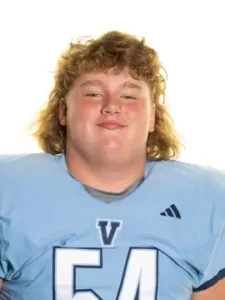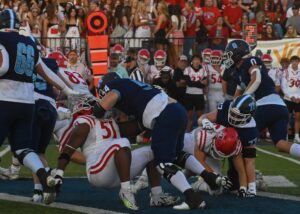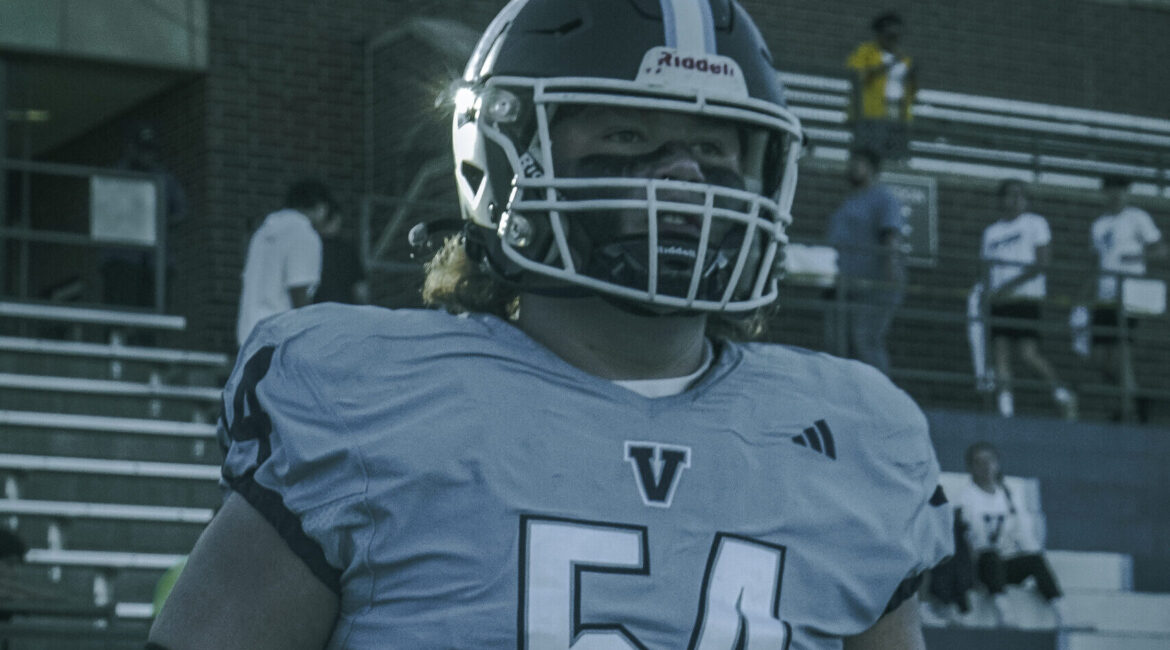By Bill Prentice, Reporter/Columnist for RepMax Media
In the ultra-competitive landscape of high school football recruitment, few prospects command attention quite like Reis Russell. At 6’3″, 275 pounds, the four-star interior offensive lineman from Colorado powerhouse Valor Christian has emerged as one of the nation’s most coveted 2027 recruits, already holding over a dozen Power 5 offers despite his underclassman status. During our exclusive interview, Russell offers rare insights into what drives elite offensive line prospects, how fishing helps maintain his mental edge, and what today’s college coaches are really looking for in their next generation of offensive line anchors — straight from a player who’s quickly becoming a priority target for major programs nationwide.
About Reis Russell: The Complete Package
 Reis Russell has established himself as a formidable presence on the Valor Christian offensive line, primarily playing center while also contributing on the defensive front. A dual-sport athlete who competes in track and field (shotput/discus) alongside his football commitments, Russell embodies the modern multi-dimensional athlete that college programs increasingly prioritize in their recruitment strategy.
Reis Russell has established himself as a formidable presence on the Valor Christian offensive line, primarily playing center while also contributing on the defensive front. A dual-sport athlete who competes in track and field (shotput/discus) alongside his football commitments, Russell embodies the modern multi-dimensional athlete that college programs increasingly prioritize in their recruitment strategy.
What sets Russell apart is his remarkable combination of physical tools and football intelligence. His college-ready frame, quick feet, and strong hands allow him to dominate at the point of attack, while his advanced technical proficiency — particularly his consistent hand placement and smooth lateral movement — has scouts projecting him as a multi-year starter at the Power 5 level. Perhaps most impressively, Russell displays exceptional football IQ, routinely diagnosing defensive fronts pre-snap and adjusting to complex blitz packages with the composure of a much older player.
“I play in the trenches man. I’ve been playing OL/DL since the 3rd grade and love every part of it. I primarily play Center now and I love the physical aspect of playing up front.”
The Motivation: Finding Drive in the Trenches
Q: What drives you to excel in your sport/activity, and who or what inspires you the most?
A: “Just achieving things that I dream of. All I ever think about is playing football at the next level and that pushes me every day to work my hardest to get there.”
Russell’s straightforward response reveals the clarity of purpose that distinguishes elite prospects. Rather than searching for external validation, his motivation comes from an internalized vision of playing at higher levels—a focus that naturally translates into consistent work habits and the “mean streak” that scouts have noted in his game film.
Q: Which professional athlete or figure do you look up to, and what have you learned from their journey?
A: “Quenton Nelson is a guy I really look up to. Watching his highlights growing up was awesome. Love the way he plays and I always keep that in mind when playing for sure.”
By modeling his approach after Nelson—widely regarded as one of the NFL’s most dominant interior linemen—Russell demonstrates his understanding of elite-level play. This connection to professional standards provides a blueprint for his own development path, and explains the physicality and finishing mentality that makes Russell such a standout performer.
Have you found that having a specific professional athlete as a model helps focus your training? Which NFL lineman’s game do you think today’s high school players should study most closely?
Balancing Elite Athletics with Life’s Demands
Q: How do you manage the demands of being an elite prospect while keeping up with academics and personal life?
A: “I just try to keep balance in my life. Sometimes just getting away from football and get out on the lake and catching some fish is nice. But then back to work right after! As long as I’ve got that in my life I’m doing great.”
Russell’s emphasis on balance through activities like fishing highlights an often-overlooked aspect of athletic development: mental sustainability. Top programs increasingly recognize that prospects who maintain interests outside football often demonstrate better long-term resilience and development curves.
“Sometimes just getting away from football and get out on the lake and catching some fish is nice. But then back to work right after!”
This balanced approach to high-performance athletics represents a maturity that college coaches frequently cite as a predictor of collegiate success—players who can maintain perspective while still committing fully to their development. For a player with Russell’s physical tools and technical proficiency, this mental approach only raises his ceiling as a prospect.
Leadership Philosophy in the Trenches
Q: How do you contribute to your team’s success, and what kind of leader do you strive to be?
A: “I just always try to bring guys up around me and push them to be the best they can. Being intense and working hard is a big priority and I hope to bring other up with me by working hard.”
Russell’s leadership philosophy centers on elevating teammates through his own example—a particularly valuable trait for offensive linemen, where collective performance matters more than individual statistics. His emphasis on intensity aligns with the demands of line play, where emotional energy often determines success in critical game situations.
This vocal presence on the line, combined with his ability to set a high standard for work ethic and accountability, makes Russell not just a physical asset but a culture-builder—exactly the type of foundational recruit that programs seek when building championship-caliber offensive lines.
Q: What does your ideal training environment look like—high-intensity competition, skill-focused drills, or a mix of both?
A: “When I’m training I always love some competition! I feel like it really bring the best out of everyone when your competing to beat each other.”
This preference for competitive training environments reveals Russell’s understanding that growth happens when pushed by peers. His embrace of competition explains how he’s developed such advanced technical skills at a young age, and suggests he’s likely to thrive in programs with depth at his position—a factor increasingly important as colleges rotate offensive linemen more frequently than in previous eras.
“I feel like it really brings the best out of everyone when you’re competing to beat each other.”
The Recruitment Journey: What Matters Most
Q: What are the top three factors you’re considering when choosing a college (e.g., academics, athletics, culture, location)?
A: “Some big things for me is having a great relationship with the coaching staff and not committing to a logo. Having that bond with them is very important. Also team culture is a big thing for me. What kind of guys do they have and how do they get along together?”
Russell’s emphasis on relationships over brand recognition represents an increasingly common perspective among thoughtful recruits. By prioritizing genuine connections with coaching staffs over program prestige, he demonstrates awareness that development often happens most effectively within stable, trust-based environments.
For a player holding over a dozen Power 5 offers already, this focus on substance over flash will serve him well as his recruitment intensifies over the coming years.
Has your recruitment experience changed how you view big-name programs versus less prominent schools with strong coaching relationships? What advice would you give underclassmen about navigating the early stages of recruitment?
Q: How much does the fan base and game-day atmosphere influence your college decision?
A: “Football and the coaching staff will always come first but I will always appreciate the fans up there cheering us on.”
While acknowledging the energy that passionate fan bases provide, Russell maintains his focus on the development environment rather than peripheral factors. This perspective allows him to evaluate programs based on what matters most for his long-term growth rather than immediate emotional appeal—a mature approach that has helped make him a priority target for major programs nationwide.
Coaching Preferences: Finding the Right Development Environment
Q: Would you rather play for a coach who prioritizes winning above all or one who focuses on player development and long-term growth?
A: “I really look for bits of each and hopefully my decision will come down to one with both aspects. I want someone who wants to win and bring his guys up with him.”
Russell’s balanced perspective on the win-now versus development dichotomy reflects a sophisticated understanding of program dynamics. By seeking coaches who can simultaneously compete while developing players, he demonstrates awareness of what creates sustainable success in college programs.
With his blend of size, athleticism, and intelligence making him a fit for both power and spread offenses, Russell has the luxury of finding the perfect system match that can maximize his potential to become an all-conference performer at the next level.
Q: What type of coach brings out the best in you—strict and disciplined, more player-friendly, or a mix of both?
A: “Honestly a mix of everything. I always want a coach to hold me accountable but someone I can have a good relationship with is very important as well.”
“I always want a coach to hold me accountable but someone I can have a good relationship with is very important as well.”
Russell’s desire for balanced coaching—accountability paired with relationship—indicates he thrives in environments with clear standards but also genuine personal connection. This preference aligns with current trends in effective coaching at elite programs, where rigid hierarchies are increasingly giving way to more collaborative approaches built on mutual respect.
Key Insights from Our Conversation
- At 6’3″, 275 pounds with over a dozen Power 5 offers, Russell represents the elite modern offensive line prospect: physically imposing, technically advanced, and incredibly versatile

- His four-star status and projection as a multi-year starter at a Power 5 program demonstrates the high ceiling scouts see in his development
- Mental balance through outside activities like fishing provides sustainable motivation through the increasingly intense recruitment process
- Looking to NFL All-Pro Quenton Nelson as a model demonstrates his understanding of elite interior line play
- Russell values competitive training environments where teammates push each other to improve
- His leadership approach emphasizes elevating teammates through personal example rather than vocal direction
- Despite his already impressive offer list, Russell prioritizes genuine coaching relationships over program prestige
Looking Beyond Recruitment
As college programs continue evaluating offensive line talent in the 2027 recruiting cycle, prospects like Russell represent a new generation of linemen who combine physical dominance with thoughtful consideration of program fit. His journey from Valor Christian’s trenches to national recruit illustrates how today’s elite high school players navigate the increasingly complex recruitment landscape with clarity of purpose and personal vision.
In a recruitment environment where offensive line development remains one of college football’s most challenging puzzles, Russell’s approach emphasizes relationships, development opportunities, and program culture over superficial factors—a perspective that often leads to more successful collegiate careers and better long-term outcomes. With his trajectory and work ethic, Russell is positioned to become not just a major college contributor, but a potential difference-maker at the next level.
What factors would you prioritize if you were being recruited by major college programs? Has your perspective on what makes a successful college choice changed in recent years? Share your thoughts in the comments below!
Bill Prentice is a recruiting analyst for RepMax Media. Contact him at [email protected] or visit www.repmaxmedia.com for more insights on emerging football talent across the country.

Awesome https://lc.cx/xjXBQT